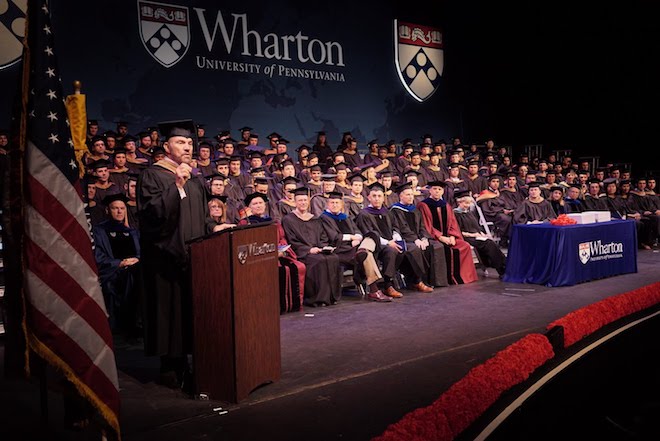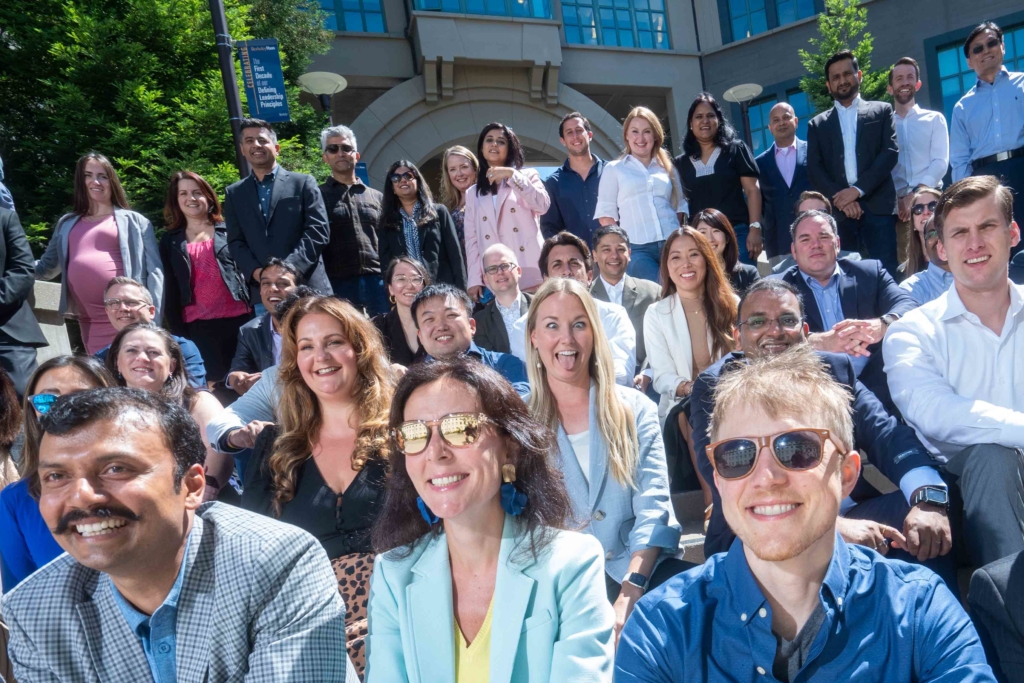
Wharton surprised observers by becoming the first top-five business school to offer an online MBA, creating a Global EMBA that will be 75% online. Courtesy photo
3. Wharton Goes Online, Launching A Global EMBA
In August, University of Pennsylvania’s The Wharton School launched its new Global MBA Program for Executives, becoming the first of the elite M7s to create an MBA that is 75% online.
The 22-month program will begin in May 2023, and students will complete three-fourths of the program in online synchronous sessions with Wharton professors. The live virtual sessions will be scheduled in early morning or late evenings, aligned to Eastern time, to facilitate working executives from multiple time zones.
The other 25% of the program will include five residential weeks. The blended online/in-person format will open up the Wharton MBA to executives from Asia, North America, Latin America, and Europe, according to a news release from the school. It is Wharton’s first-ever online degree program as well as its first global cohort for its EMBA program. It’s also the most globally accessible MBA program among its peer schools.
“The evolution of the Wharton executive MBA is a reflection of our entrepreneurial spirit and dedication to innovation in educational pedagogy,” says Erika James, dean of the Wharton School, in the release.
“The past two and a half years have proven that high-quality academic programs can successfully extend beyond the traditional in-person classroom experience. By coupling best-in-class virtual instruction with meaningful residential learning opportunities, we can extend the reach of a Wharton MBA education to even more leaders who are poised to grow economies and transform industries across the globe.”

How much does a top-ranked EMBA cost?
4. Total Cost At P&Q’s Top Ranked Executive MBAs
Here’s the straight talk: Earning an executive MBA is an investment no matter how you look at it. Even the least expensive options are going to set you back $50,000, but you’ll be sacrificing at least some prestige. At the top schools, expect to pay upwards of $160,000 with the best programs soaring over $200K.
Now for the glass half full perspective: The career coaching, professional networks, and resume boosts an EMBA brings can lead to significant career advancements in future years. The Executive MBA Council (EMBAC) reported that 14.7% of students exiting an EMBA program in 2021 reported getting a raise by the time they exited the program (typically between 16 and 20 months). Another 36% of students reported receiving a promotion while 49% reported receiving more responsibilities in their jobs, and average compensation rose from $166,549 at the start of their programs to $190,989 at the end.
While there are multiple factors to consider when evaluating EMBA programs, Poets&Quants for Execs is here to shed some light on at least one variable: Total cost.
We scoured through school websites to find the tuition data on all of the schools on our most recent Executive MBA Ranking. See how they stack up here.

The UC Berkeley Haas School of Business executive MBA is marked for its collaborative, non-competitive cohort. Courtesy photo
5. A Decade After Its Split With Columbia, An EMBA That Is Uniquely Haas
UC-Berkeley Haas started its first EMBA program 20 years ago as a partnership with Columbia Business School, bringing together the faculties and strengths of two top-ranked business schools. Together, the two powerhouses created an executive MBA that was a sort of West Coast meets East Coast, Silicon Valley meets Wall Street.
While it was Haas’ first EMBA offering, it was one of several such offerings for Columbia. In March 2012, the two schools jointly announced that they would end the partnership the following year, and Haas would launch its first stand-alone EMBA in 2013.
This year, we revisited the split to see how Haas’ EMBA was fairing 10 years later. Hint: It is thriving.
Haas has a strong culture of inclusion and altruism that radiates throughout the faculty, staff and students,” Fiona Baker, EMBA ’23, told Poets&Quants in September. “It was amazing how quickly we were able to build psychological safety and trust by sharing our authentic selves, and that attitude has persisted through the program.
Diver deeper into this top EMBA program in this story.

Some of our Best & Brightest EMBAs’ favorite professors.
6. Favorite Professors Of The Executive MBA Class of 2022
It takes humility to return to business school. In unfamiliar terrain, some EMBAs devolve from confident leaders to awkward novices. That’s where great teachers come into play. They’ve never forgotten what it means to be a learner. Looking out, they can see themselves in their students. Sometimes, they can even feel the doubt and fatigue that can seep in early on. So they work to make the material relevant – urgent even – so students can see why it matters…and how they can put it to work immediately.
For this popular story, we ask our Best & Brightest EMBA students to tell us about their favorite business school professors and the impacts they’ve had on their careers.
Take Nelson Repenning, who teaches Organizations Lab at MIT’s Sloan School of Management. According to Rhamey Elhosseiny, a ’22 grad, Repenning mixed work design frameworks with cognitive psychology to make his tools more practical and effective. Long-term, Repenning’s legacy will be acting as a voice in Elhosseiny’s head – replete with a question that can start a productive dialogue with anyone at any level.
Learn more about all these inspiring professors here.
NEXT PAGE: Q&A with Wharton’s new MBA vice dean + 10 best EMBAs for under $100k





Questions about this article? Email us or leave a comment below.